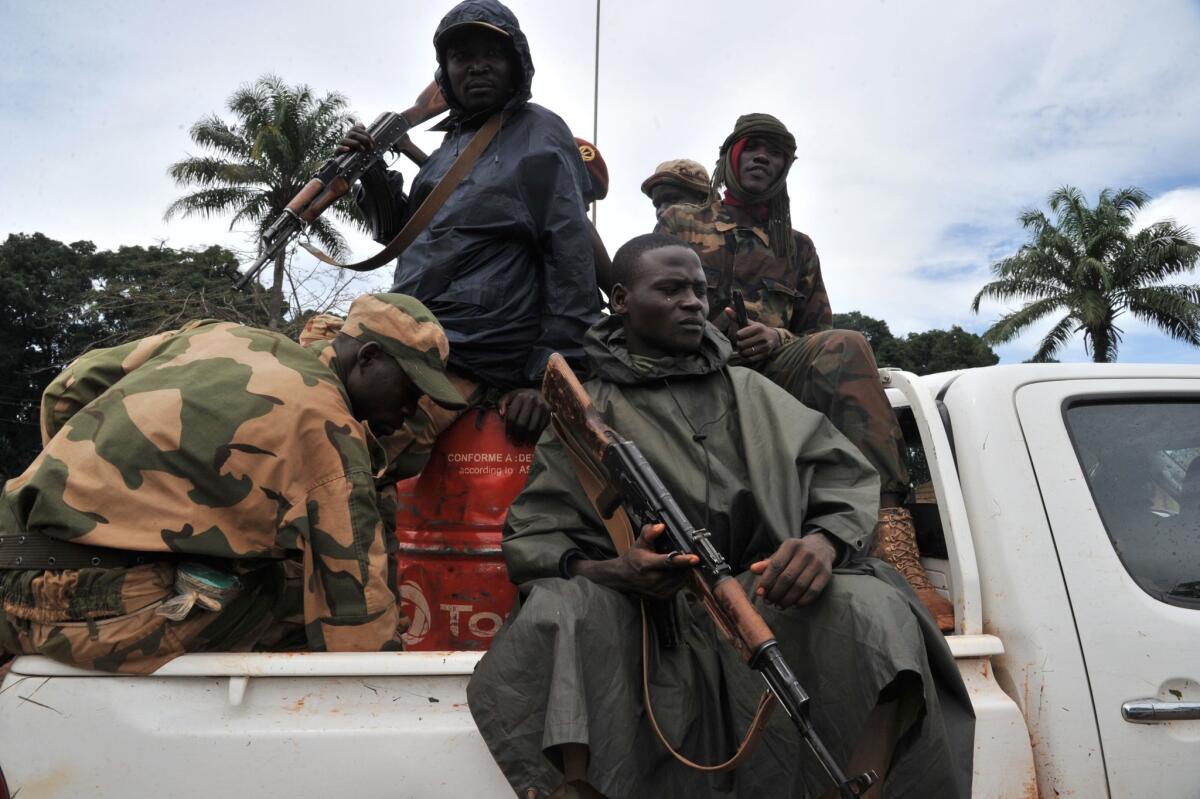Central African Republic forces attacking civilians, agencies say

JOHANNESBURG, South Africa -- Government forces in the Central African Republic have launched attacks against civilians as the country lurches dangerously toward violent chaos, according to the United Nations and humanitarian agencies.
The latest warning came Wednesday from Doctors Without Borders. The group’s physicians have treated dozens of people in recent weeks from shotgun and machete wounds after gunmen associated with the transitional Seleka government attacked villages in the country’s northwest.
The organization reported that violence had reached “unprecedented levels” in recent weeks.
Last month the U.N. and Human Rights Watch warned of new clashes in the northwest and in the capital, Bangui, amid fears the country is on its way to being the world’s next failed state.
More than 310,000 people have fled the violence this year, according to the U.N.
The landlocked country has experienced wave upon wave of conflict over the decades that have left it with high mortality rates, rampant disease and poor government services such as health and education.
“Seleka forces have destroyed numerous rural villages, looted countrywide, and raped women and girls,” Human Rights Watch reported last month.
Doctors Without Borders spokeswoman in Bangui, Ellen van der Velden, said Wednesday in a telephone interview that thousands of people had fled their homes around the town of Bossangoa to escape violence. In one case, 28,000 people had taken shelter in a Roman Catholic mission.
Seleka forces seized power in a coup in March, after mounting a rebellion against the government of President Francois Bozize, who fled the country. Interim President Michel Djotodia has denied Seleka forces have attacked civilians, blaming bandits.
“In the last month, we have treated more than 60 people in Bossangoa for injuries that are the result of violence, largely gunshot and machete wounds, including women and children. MSF [Doctors Without Borders] is horrified by what we are seeing, including burned villages and appalling scenes of murder,” Erna Rijinierse, a surgeon with the organization, said in a statement.
Van Der Velden said many people fleeing violence had taken refuge in their fields, adding it was impossible to know how many people were displaced, wounded or killed.
“I am worried that so many people are living out in the bush with limited possibilities to access us,” she said.
She warned of a looming food crisis, since many people fled without supplies and have faced looting by attackers.
“Definitely food is one of the worries that is on people’s minds,” Van Der Velden said. “Right now is the season in which people should be harvesting, but they are hiding themselves.”
Last month the U.N. urged the government to take steps to protect civilians from violence.
“The breakdown in law and order in [Central African Republic] is absolute and is of deep concern to the humanitarian community,” Kaarina Immonen, U.N. humanitarian coordinator for the country, said in a statement last month. “This continued crisis is having a severe impact on the civilian population which is targeted, with persistent violations of human dignity and international humanitarian law.”
Van Der Velden said Tuesday that staff had witnessed the execution of a health worker by men from an armed group. Humanitarian workers had been frequently threatened, and a climate of fear prevailed.
She said Doctors Without Borders had for months been calling without success for the return of civil authorities, including police and hospital staff, leaving civilians with nowhere to turn to for support or protection.
Even before the coup, the country’s healthcare system was extremely weak, Van Der Velden said.
“We have often typified this as a crisis on top of a crisis. The few clinics and hospitals that people had before are no longer there,” she said. “Humanitarian assistance is very much needed.”
The Human Rights Watch report last month said at least 1,000 homes had been destroyed and scores of people killed, with credible reports that hundreds more had been slain.
It said Bozize had a poor human rights record, but the vast majority of abuses this year have been carried out by Seleka forces, adding that the group’s leaders seemed to have trouble controlling their soldiers.
ALSO:
Germany’s Angela Merkel struggles to form a government
Who knew? German insomniacs watch NASA space feed all night
Egyptian foreign minister cites ‘disturbance’ in relations with U.S.
Twitter: @latimesdixon
More to Read
Sign up for Essential California
The most important California stories and recommendations in your inbox every morning.
You may occasionally receive promotional content from the Los Angeles Times.










